#but in terms of like themes and narratives and stuff there's just something about it that's so compelling
Explore tagged Tumblr posts
Text
I want to challenge us all to step outside of our fan brains (some sometimes rot; it happens to us all) an watch the story that is being told to us explicitly. Remember, this show is not subtle. It is the very opposite of subtle.
The episode opens with Buck getting his stuff moved into the (not Eddie’s because Eddie was a renter) house by very unhelpful movers. He’s anxious and timid. We’re immediately reminded of the ghosts that haunt that narrative. Buck is just taking heaping slice after heaping slice of abandonment issues pie.
The opening emergency screams in our face themes of second chances (i.e. Buck getting a second change to save someone by just taking his hand, a nod to 1x02 where he lost Devin.)
He goes to stay with his sister and we get their first of two talks of the episode. [Here I want to note that the purposes of these talks are exposition. These serve as a direct line of interiority from Buck to the audience.]
B: … it doesn’t feel like my new place. It feels like Eddie’s old one, which is trickier than I expected. Everywhere I look its just one big reminder that my best friend is gone… and it sucks. M: As your big sister I’m going to have to give you some uncomfortable advice… make new friends.
Then we have Buck being awkward and weird with Ravi where it’s obvious that he’s trying to replace Eddie in a sense. That was Eddie’s favorite… etc etc Ravi fought for his life in that bar where Buck drunkenly continues to talk about Eddie. His best friend. This ties back into the opening emergency where Bobby kept calling Ravi ‘Eddie’. He is a stand in for Eddie. So Eddie would never do anything illegal, Eddie took me here, Eddie played quarters.
What happens when Ravi is over it? He took a second out to go to the bar and runs into Tommy. Ravi is like thank god, here’s my out. You know what stops being mentioned more than time? Eddie.
In the conversation Eddie is not haunting that narrative. He’s haunting the friendship narrative.
T: You know; I’ve been fighting the urge to call you for months…
This is a direct narrative parallel to Buck baking every time wants to call Tommy. A fact the audience has been reminded of every episode since the breakup. Every episode specifically mentions him except Sob Stories (which had a lot of other shit going on).
Buck shoots his shot and like a moth to a flame, Tommy was like lessgo. We see them Tarlos style tumble into the house (which as you know ended in an eh, it was cool, I’ll see you around, but we know how their story ended) and they were so wrapped up in each other that Tommy didn’t even realize they were in a house he had been in multiple times before they were physically in it.
Wham bam thank you ma’am.
The next morning opens with Buck thinking that Tommy left because the side of the bare ass mattress was empty. The kitchen scene opens with Tommy putting some bodega champagne in the freezer (likely for mimosas—regardless a celebration). A brunch spread large enough for a family spread out on that tiny counter. His coffee maker unpacked and set out. (Something is to be said about Tommy being the first person to unpack something in the house.)
Buck tells him that’s the best night he’s had in the house yet… even though it’s the first night.
They banter and they are so close to being back together, but Tommy lets his insecurities show and Buck, who has been emotionally dysregulated since November lashes out and immediately regrets it.
Tommy leaves, but this time it doesn’t feel final.
In the next rescue of the wife in the garden, he makes the assentation that “Long term relationships are hard,”—acknowledging that there are going to be hard times and miscommunications
We have our second sibling talk of the episode where Buck is back staying with her.
B: What is that even supposed to mean? I’m living in Eddie’s old house, therefore I must be in love with him (confused question mark)?? M: Are you? B: (Flabbers are ghasted) With Eddie?? M: It wouldn’t be so crazy. B: (confident and without hesitation) Except that I’m not. As much as everyone seems to want me to be hopelessly pining for my straight best friend. It just isn’t like that… does not having him in my life and in the field leave a big hole? Yeah, it does, sure. M: Okay, so did you explain that to Tommy? B: (visibly regretful) In the meanest way possible. I understand him feeling threatened by what me and Eddie have. But he seemed so relieved that he was gone.
(of note, it seemed like that to Buck, not to the audience. It was passing insecurity to the audience. But we know we can be really unreliable narrators of our own conversations.)
B: (continuing) It felt like he was accusing me of something. Is this what he was thinking the whole time we were together? M: I don’t know. (You need to use your big boy words and ask him yourself, bestie) B: It just it sucks. It was the first night that I was actually able to sleep in this place. M: Okay, maybe you shouldn’t be living there. You said that you haven’t even unpacked yet. B: Yeah, um. I think maybe I don’t wanna unpack because as soon as I do that it means Eddie and Chris aren’t coming back. For real. […] I should call him, huh. (Tommy, duh). M: That’s what I’ve been saying, its not like he moved to Mars. B: N-not Eddie. I mean, I will call him… Tommy. I should apologize, he’s probably right. I was using him as a distraction so I didn’t have to feel alone. M: Not the best reason to get back together with somebody. B: (sniffles) I know. (tries not to cry) M: Maybe its time you learn the lesson again: how to be alone. B: I hate that lesson.
The final montage before the crossover intro, is Buck coming to terms with the situation. He is happily unpacking his stuff and making the house his home. His home. This is all of about seven show minutes after telling his sister that unpacking means accepting they’re gone: Eddie and Chris and its not the end of the world or even his world.
He has accepted that they are gone. He’s ready to work on moving on from that part of his life. He is sad about Tommy and knows he didn’t end it well. We see that they are on the same page about wanting to be together. They are in a classic third act of the miscommunication romcom trope.
These are tropes for a reason: because they are predictable and they work.
If you took out the names Buck, Tommy, Eddie, and Maddie and put in random names into their story, not the characters that you have become attached to, you would read it as the wheels for a reconciliation in process.
#911 discourse#911 spoilers#sorry it got long but I needed to say this#this show literally speaks to you#the people that this show is written for will never read 99% of those interviews#evan buckley#tommy kinard#bucktommy#maddie buckley han#otp: come home and be with your man#911 abc
252 notes
·
View notes
Note
hi cutie ok i love ur account sm everything you write is absolutely AMAZING and just your theme and the vibes are so cutesy ughhh!! not to mention you’re unbelievably active.. and the stuff you write is still top tier quality 😭 you’ve probably already did this prompt before so ignore if you have !! do you think rafe would let reader have friends over on her birthday? or would he insist it’s “her special day” and she should just let HIM spoil her (mostly with gifts and his cock, obviously)





Rafe would absolutely take a very possessive and indulgent approach to your birthday, especially considering his dark, controlling side. He’d see it as the perfect opportunity to spoil you—but on his terms.
In his mind, it’s your day, yes, but that also means it’s his chance to remind you how much he takes care of you and how much you belong to him. So, if you wanted to have your friends over, he’d probably allow it, but only with a series of conditions and with him controlling the narrative.
Rafe would let you have a little bit of space for your friends—maybe a quick brunch or a light afternoon activity. But as soon as your friends leave, it’s his time. Before you even think about gathering with anyone, he’d probably have arranged something for you to pamper yourself beforehand—something he deems fitting.
“Go get your nails done at the best spa in the city,” he’d tell you in his smooth, authoritative tone. “And while you’re at it, get a wax. You’ll need it for later.” He'd raise an eyebrow, that smirk pulling at the corner of his mouth.
By the time you get back to the penthouse after your spa day, the place would be perfectly curated with all the things that fit your aesthetic. He’d know exactly what you love, and nothing would be left to chance. The place would be filled with vintage Barbie dolls, Sonny Angels, Sofia Coppola merch, and delicate coquette tops and trinkets that make your heart flutter with excitement. It’s not just a gift—it’s an experience he’s built around your desires.
You’d walk in, stunned at how perfectly he’s crafted the space just for you. A quick glance at the mountains of gifts, and your breath would catch. He knows exactly how to make you feel like his princess—but not without reminding you of your place.
Rafe’s spoiling wouldn’t just stop at the physical gifts. As he watches you enjoy the presents, there’s this feeling of satisfaction in his eyes. He’ll definitely get a thrill from seeing you so excited over everything he’s gotten you, all while subtly reminding you of his control.
“Do you like all of this?” he’d ask, his voice low and knowing. “I did it all for you, baby. Now, take it all in.”
And of course, he won’t just let you bask in the gifts. He’d expect a reaction, maybe even a kiss or two, as you show your appreciation. He’d slowly strip you of your coquette tops, getting closer to that perfect moment when he can admire the wax he paid for.
By the time the gifts are opened, you’re probably feeling like you’ve been thoroughly spoiled, but Rafe isn’t done. He’d pull you close and, with that insistent touch, he’d start to inspect your skin, making sure everything is exactly how he wants it.
“You look so perfect,” he’d say, his fingers tracing the smooth skin he’s so proud of, a dark gleam in his eyes. He wouldn’t be shy about reminding you who’s responsible for every single detail of your day.
He’d definitely inspect you carefully, his touch lingering as he praises you but also maintaining that subtle dominance he thrives on. It would be a mix of tenderness and possessiveness, a moment where he could feel ownership of your body in the most intimate way, all while treating you like the precious thing you are to him.
The night would go exactly how he wants it to—him pampering you in every way he can think of, from the physical indulgences (gifts, wax, pampering) to the more intimate parts (his hands, his touch, and his complete control over your time and attention). By the end of it, you’d know exactly who you belong to, and it would be a mix of indulgence, pleasure, and subtle reminders of how Rafe likes to make every moment about him, even when it’s your day.
All in all, Rafe’s reaction would definitely be a combination of indulging you completely while still keeping everything under his control. He’s the kind of guy who loves to spoil you, but it’s always with that sense of ownership in mind.

#cameronsbabydoll ⋆. 𐙚 ˚#anons ♡⸝⸝#sugar coated chains ૮꒰◞ ˕ ◟ ྀི꒱ა#sugar daddy rafe ᦏ♡᪔#sugar daddy rafe cameron#rafe cameron#rafe cameron headcanons#rafe cameron fluff#rafe cameron x yn#rafe cameron x reader#rafe obx#rafe cameron blurb#rafe cameron fanfic#rafe cameron drabble#drew starkey x you#drew starkey x reader#drew starkey#rafe cameron fic#rafe cameron fanfiction#rafe cameron smut#rafe cameron series#rafe cameron x you#rafe cameron prompt#rafe cameron x female reader#rafe cameron x innocent reader#rafe cameron x shy!reader#rafe cameron x y/n
196 notes
·
View notes
Text
After all these years, ‘I Remember You’ is still one of the great highlights of Adventure Time Storytelling. And not just in the basic ‘what???? Silly children’s cartoon does something SAD??? HOLY SHIT MIND BLOWN’ way. But with the execution of that Something Sad. How it manages to pack so many Complex Emotions into just 11-minutes of television. And especially the way it utilizes the basic Adventure Time format for that purpose.
So Adventure Time is a Board-based show. Each episode has an outline pitched and written down by the writer’s room, and then this outline goes to a team of (usually) two Storyboard Artists who develop that simple outline into a full story. And with the show’s art-style deliberately eschewing staying perfectly ‘on-model’ in favor of having the animators take direct reference from how the different storyboarders draw the characters
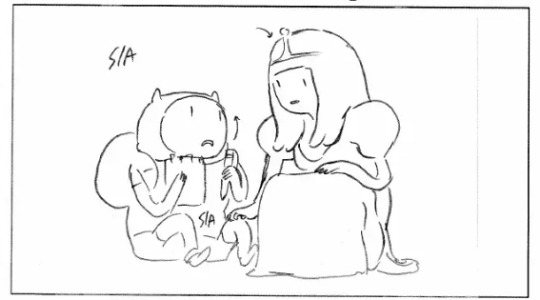

And the show being generally extremely versatile in terms of themes and tone - AT has allowed a lot of their Storyboarders to really express themselves and their unique artistic vision as part of the Big Collaborative Narrative that is Adventure Time.
Now, the Boarders who worked on ‘I Remember You’ are Cole Sanchez and Rebecca Sugar. These two were a Storyboarding Duo from the start of S4 and until Sugar left the AT Crew during S5, and they always struck me as a curious combination. I think really from all of the individual boarders working on AT during that time, these two really are the closest to having like… Totally Opposite Artistic Sensibilities as boarders.
With Sugar favoring a style that is very loose and sketchy and also very rounded. Focusing on expressions and subtle body language and lighting. And being famous for going deep in depth into Big Moments of Emotional Catharsis
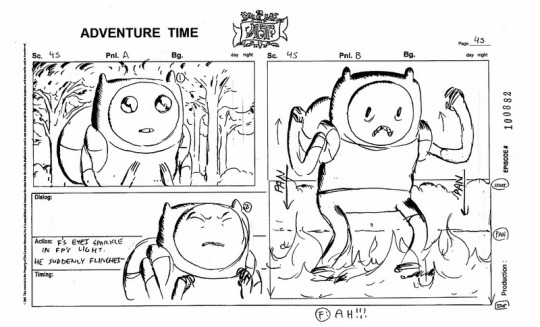
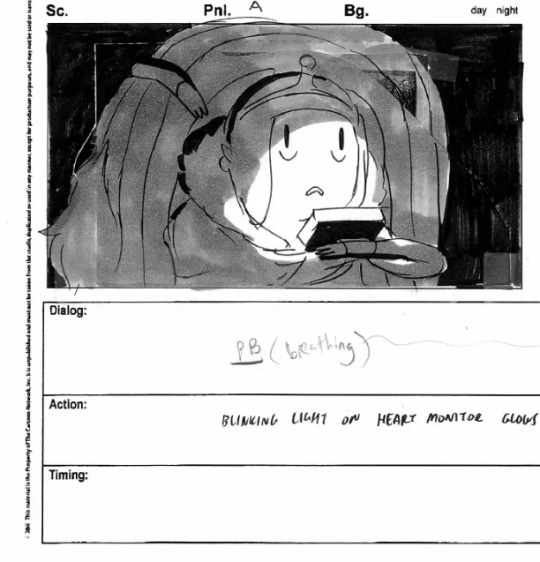

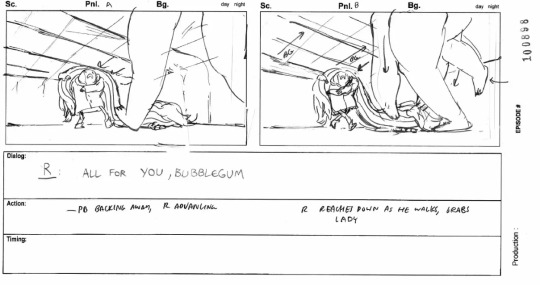
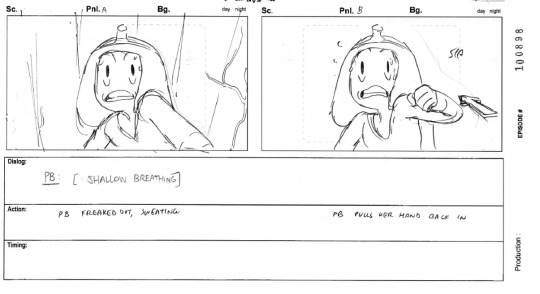
And Sanchez having a very clear art style that emphasizes strong silhouettes and clear lines that suggest flatness. Focusing more on major poses and the character’s positions in the space. And having just a really great eye for AT’s brand of silly humor.

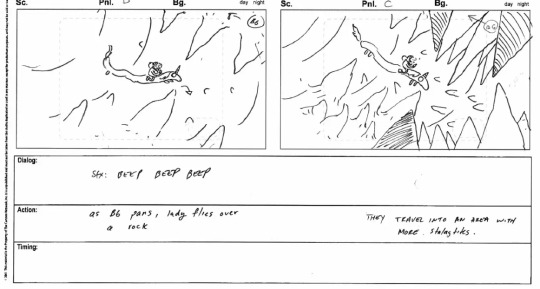

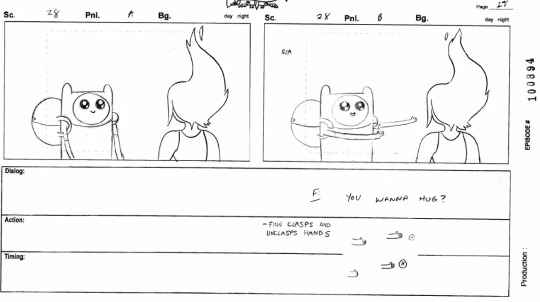

Like, I almost kinda suspect these two were paired together so they can each cover for the other’s “weakspots” in writing ‘Adventure Time’.
And there were a few episodes that did some really interesting stuff with this very contrasting pair - ‘Jake the Dog’ is another example. Giving most of the Farmworld scenes to Sugar and most of the Time Room scenes to Sanchez both plays to their personal strengths as storyboarders and helps to emphasize the strong emotional contrast between these two scenarios.
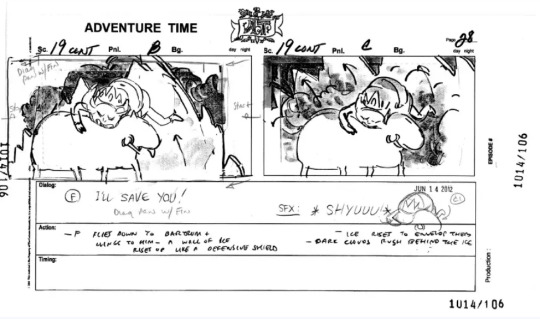
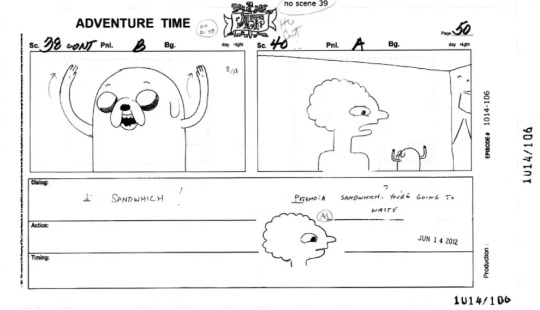
And ‘I Remember You’ is actually kinda unique among Adventure Time episodes cause… Most episodes will have the two boarders alternate between working on the episode throughout it. Like you’d have Boarder A draw a bit and then Boarder B and then Boarder A again… But “I Remember You” is divided between Sanchez and Sugar… basically perfectly in the middle.
So the entirety of the first half of the episode was boarded by Sanchez




Until Ice King pushes Marceline and then leaves the room in shame.
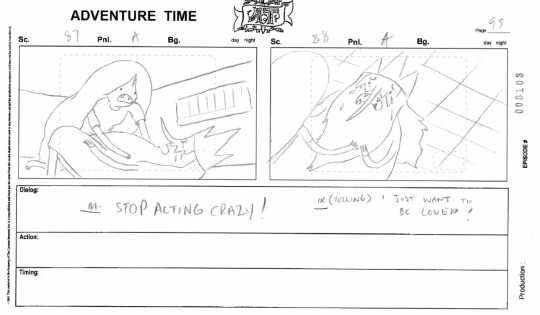

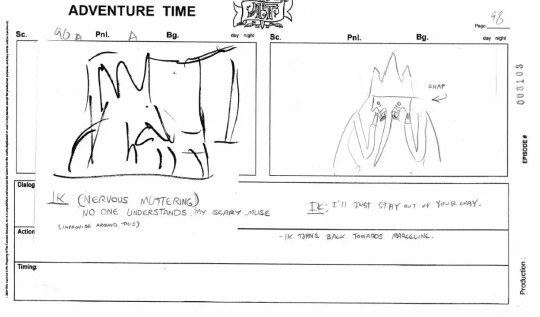
And then, Sugar takes over.

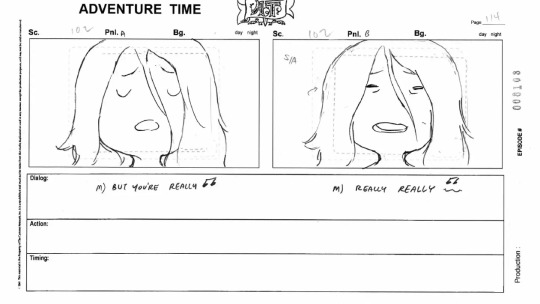
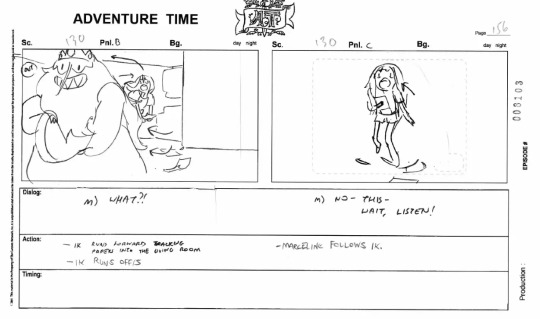
And, like, even if you don’t know anything about the Behind the Scenes of Adventure Time or who Cole Sanchez and Rebecca Sugar even are - the Shift is noticeable. The shift in tone, in narrative focus, in the subtleties in which the characters are drawn.

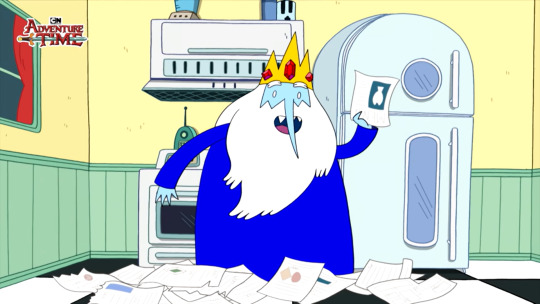
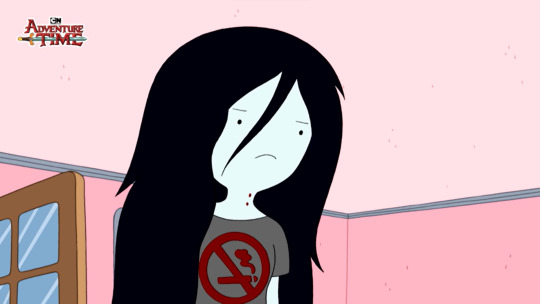
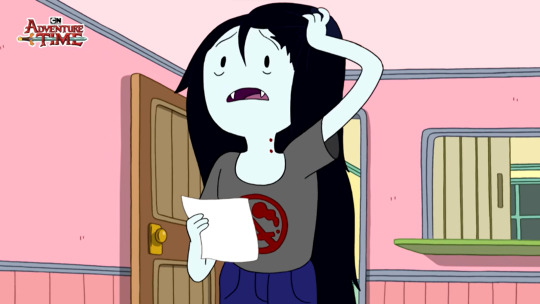
The entire first half of the episode has this thin veneer of just being a Silly Goofy Ice King Episode. Sanchez’s talent for Adventure Time’s brand of comedy is on full display… but there is also this underlying feeling that Something is Happening just under the surface. And these hints of the Big Emotions of ‘IRY’ expressed via Sanchez’s kinda goofy style really create this balance between putting the audience into a false sense of security that this is just a Very Normal Episode about two characters hanging out and the Tension constantly brewing in the subtext.
And then it all comes to a blow.
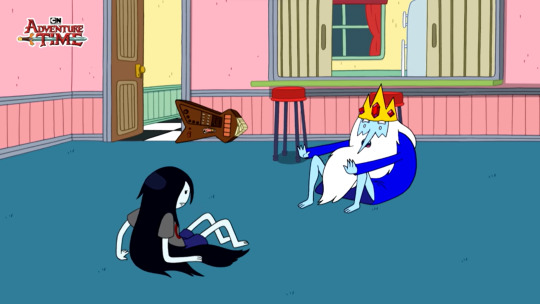
And then the Shift happens. And now we are in Sugar’s court.
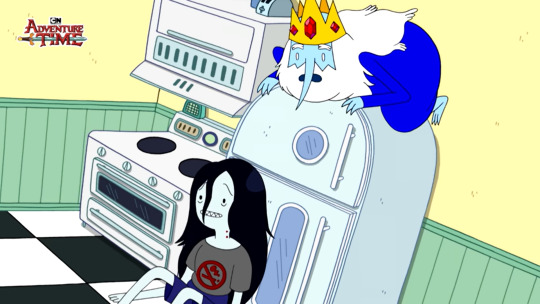
And this subtle shift in the artstyle and storytelling also coincide with Marceline finally openly expressing her feelings and the Reveal of Simon and Marcy's shared past. The episode changes focus from Ice King's silly antics to Marceline's feelings. Everything changes, everything in the first part of the episode gets recontextualized and... even on the most basic level, the episode is now Noticeably Different.
I would almost say that Sanchez’s half of the episode has Ice King define the tone, while Sugar’s half of the episode has Marceline define the tone. But more than anything it’s the catharsis. The reveal and release of those emotions that were building up so expertly through the Sanchez half of the episode. All of the Sugar-boarded scenes in this episode are really heartbreaking on their own, just through the tragedy of the story and Sugar’s expert knowledge of howto convey emotion in the visual medium - but it’s so enchanted by what came before it.
“I Remember You” is truly a great testament to how ‘Adventure Time’ could use every aspect of its medium to tell a great story in such a short time.
#adventure time#at#atimers#adventure time analysis#i remember you#rebecca sugar#Cole Sanchez#storyboard#ice king#simon petrikov#simon and marcy#the ice king#marceline#marceline the vampire queen#marceline abadeer#at ice king#at simon#adventure time ice king#adventure time simon#ice king adventure time#simon adventure time#simon at#marceline adventure time#at marceline#adventure time marceline#marceline at
690 notes
·
View notes
Note
I came across that silm nobel prize argument you mentioned in yr tag. I’m not asking about the ship war stuff, I know you don’t do ship stuff but only if you don’t mind, I was interested in hearing yr thoughts on the accessibility stuff they were talking abt, like what makes a fanfic acessible. I was thinking of your post on making your AU acessible for a fanfic reader, and it made me think that the nobel prize OP was using the word inacessible in a wrong way?
I assume this refers to that ‘Silm writers are inaccessible & elitist compared to TROP writers, nobody wants to write an essay about the fanfic they read, flower shop AUs have more ‘real human emotion’ than thematically dense fic, it’s AO3 not the Nobel Prize longlist’ nonsense unless there’s another one floating about in which case jesus fucking christ lol
It’s an interesting one lol… I don’t follow the page or post about the show so I didn’t see it, but a bunch of people have DMed it to me across the last couple weeks, since while the OP was speaking in general or collective terms, I tick a few of their shitlist boxes in a rather obvious way lol. I’ve said variations of this across said DMs and other writers may have a different opinion but essentially:
I personally don’t treat ‘accessibility’ as a concern when it comes to fanfic, unless we’re talking disability accommodations like alt-text or not using emojis, or tagging for triggers. ‘Must be enjoyable for people who like a certain style of writing’ is not an accessibility requirement, it’s your Goodreads wishlist. I do not care about what you want Santa to bring you. Perhaps it’s because I’ve not been in fandom long enough but I genuinely cannot think of a response aside from ‘get a fucking grip lol’.
And re your question about my AU, what I meant there by adapting the story for a fanfic audience was that I toploaded it with regional context and diaspora eyes before getting into the actual narrative in a way I wouldn’t have done if (god forbid) I wrote it as a novel. That isn’t a comment on style or theme, it’s literally just because I’d expect that someone walking into a bookshop, picking up, and paying for a book about a Marxist madhouse in North Kerala full of intertextual elements so thinly veiled as to be practically wrapped in clingfilm, would be at least vaguely familiar with the genre and context.
This is something I would not assume of people scrolling through AO3, because there’s no reason to expect that, hence providing extra info, being conscious as to what I can’t presume people already know, putting some extra elbow grease into “world building”, translating within the text itself, answering questions about regional/historical context etc… it’s not an accessibility measure, I’d say it’s closer to providing an appendix/glossary.
I don’t know, like imo it’s kind of ridiculous to sit around shitting on people for writing narratives more complex than what you personally like, but that’s your space, preference and prerogative… go ham and shit away, it is your toilet, not mine.
My irritation is mostly with the language of “accessibility” and “elitism” and trying to make it sound like a societal ill by using such buzzwords. Yes, there may well be elitism or lorebros or whatever in a general fandom sense, but I don’t know what fanfic has to do with that.
The Silmarillion probably does have a higher concentration of whatever they mean by Nobel Prize fics but that’s not exactly due to some oppressive feudal fandom hierarchy, it’s literally just because the fanbase skews older and the source text is conducive to a certain style of literary writing being relatively popular… it’s not some big injustice, it’s pretty normal, generally speaking, for fanworks to reflect the style and tone of the source text regardless of how transformative they are, simply because the one thing most people in any given fandom share is their enjoyment of said source text.
I like to think of myself as being well read but there are tons of books ‘inaccessible’ to me beyond reading preferences. When I was at university I worked on regional literature but I always specified Malayalam rather than ‘South India’ even though the college used the latter as a tag, because I can’t read Tamil or Kannada etc—that doesn’t mean those languages are inaccessible languages. One’s experience as an individual is not a benchmark for something already as subjective as accessibility. I’m not exactly going to call the Dance Mums fanbase elitist gatekeepers for writing fanfiction just because I’ve never seen an episode of the show.
Also not to be an insufferable pedant but like… if someone wants to use ‘publishable standard’ as a negative term, they should probably look up what it means. Publishable standard just means that a work is fit for publication, it’s not meant to be a comment on genre, style or content. The Cat in the Hat is of publishable quality but that doesn’t mean Dr. Seuss should win the Booker.
Finally, I know the OP was speaking in general and refers to a ‘group’ of writers but speaking for myself, l’m sorry I simply cannot see how on earth a style of writing can make someone elitist: I don’t deny I’ve spent years with the academic silver spoon up my ass, I have openly acknowledged it on multiple occasions both joking and otherwise, and also do not deny that comes across in the way I write.
However, my blog is 80% pure shitposting. My AO3 page isn’t required reading. You do not have to enjoy my writing style in order to interact with me, you are allowed to find it insufferable because it often is insufferable. Hell, you can even tell me you hate it, preferences are subjective. There is no gatekeeping here. Nobody is holding quiz nights about 1970s India and beating people if they get a question wrong.
TLDR: yes, yes, fanfiction doesn’t have to be of a publishable standard because it’s people writing for fun yes, yes, elitism is bad, yes, yes, but that doesn’t mean ‘not writing a flowershop AU’ is some kind of systemic oppression against the AO3 proletariat lol.
Hope this went some way to answer your question!
56 notes
·
View notes
Text
Okay, I've Read Worm: A Retrospective Part 2: What The Fuck Did I Just Read?
So I don't mean literally 'what did I read'. I know and understand the plot, and while I probably didn't pick up on all the references and cape theme stuff Wildbow was going for, it was established a while ago that I wouldn't. And I may not have understood every scene and character the way may intended, but sincerely, fuck his intent, it sometimes sucks.
What I mean by this is -
I heard a lot about Worm before I read it. "Grimdark" "Depressing" "Optimistic" (Yes, someone actually called Worm an Optimistic Work which is... a take), "Bleak" "A Deconstruction" "A Love Letter To The Superhero Genre" "A Takedown of the Superhero Genre" "Just A Fucking Story" "The Greatest Piece Of Superhero Media Ever" and god knows what else.
I didn't hear anyone call worm a Reconstruction until I was partway into the Work, when I also discovered TV tropes calls it that which is... well, we'll get into that.
And I heard Wildbow called "A Hack" "A Nihilist" "A Guy Who Lets His Problems With Authority Get Ahead Of Him" (Or something to that effect" "An Amazing Writer" "A God Amongst Men" (Okay, not really on that last one, but I have made jokes about Wildbow having cultists or the 'Church of Wildbow' for a reason, because some people are really fucking out here acting like he's just... way better than he is, imo. Like, beyond just the degree of just subjective opinion. Not that I think Wildbow deliberately fostered such a mentality... probably)
So. What the fuck did I just read? What is Worm?
Well I am comfortable in saying that Worm is Grim, Bleak, Depressing. A lot of really bad shit happens without neat narrative resolution, there's a lot of hurt and not a lot of comfort. Taylor's life mostly gets worse, and most other people's lives mostly get worse. There's not a lot of unambiguous victories, even the ones that are straight up victories come at hilariously lopsided costs, the whole damn world is slowly collapsing, and everyone in authority is largely either complicit, incompetent, overwhelmed, corrupt, or useless. Almost nobody is just straight up heroic, and those who are usually die (in often pointless ways) or get treated as incredibly naïve by the narrative. Often both. Worm often feels pretty hopeless, and even the hope is pretty fragile and strained, when it's there.
Is Worm dark? Is it Grimdark? Well... that's trickier. There are a hell of a lot of dark implications of Worm, a lot of dark stuff that is hinted at, or insisted is there by the writer (*cough* *Cough*) but in terms of the actual darkness onscreen... depending on how one defines 'Grimdark' - how reliant are they on the conventional 4chan inspired definition or if they've expanded their understanding of the word and so on - it could qualify, but... *equivocating hand gesture*. I am reasonably comfortable that Worm itself never really quite qualifies as grimdark. The darkness on the screen is not really enough, and really, under the narrowest of 4chan definitions, it probably isn't even grim. Though I would say that there's a point where the 4chan Noble/Grim Bright/Dark four quadrant approach becomes a useless category of analysis.
I think in most cases people who call Worm grimdark are either parroting other people, lack adequate terminology to really describe what they mean (because Worm is rather hard to put a box around) or have very low standards for 'grimdark'. But I don't think everyone is talking out of their ass, because like I said, there's a lot of really dark implications of Worm. Some likely intended by Wildbow, some the result of probably oversights by him or didn't really quite grasp certain things and just kinda... threw stuff out there without following through. (Not that I blame him, Worm was huge and not every single detail needed to be followed through on, but still. Happens). Worm's entire universe and setting runs on people rather consistently making the decisions that make shit worse.
Like in 90% of the cases, each individual person's decision to make shit worse makes sense from their perspective and understanding their psyches, but it does strain credulity a little, and make it hard to say the story isn't kinda grimdark when almost every decision almost everyone makes makes things worse.
But... technically, I think Worm manages to skate by being grimdark. Sometimes just barely, but just barely can be enough.
I don't think it's particularly controversial to call Worm 'A Deconstruction' or to say that Worm deconstructs elements of the superhero genre. Does Worm Reconstruct... well, yes. It does the deconstructing thing (exploring how so many common elements of the superhero genre don't make a lot of sense) and then it does the reconstructing thing (putting them back together and designing the physics and rules of the universe so they kind of do make more sense).
But I would say that calling Worm a 'Reconstruction' is false advertising. Not because it isn't, but when most people hear the word Deconstruction, they expect a kind of depressing, bleak, grim, sometimes dark, etc story. Reconstructions are thus expected to be more upbeat and optimistic and bright. I don't think this is just me. To be fair, this doesn't have to be true. A deconstructed slasher flick would probably be fairly upbeat and bright, and a reconstructed slasher flick would... probably not be those things. But I think the general implications of the words remain true.
Telling someone Worm is a Reconstruction of the Superhero Genre, before they read it, without a lot of qualifiers, would, I think, be pretty deceptive. Accurate, but deceptive. It is possible to be misleading while being totally accurate, after all.
One thing I hear a lot about is how much more 'realistic' Worm is compared to other superhero media. Without being a deep aficionado about superhero media, I honestly can't say if this is true, but I can say that, as of itself, Worm is not what I would call realistic. Leaving aside the way Wildbow puts his thumb on the scale of 'everyone makes decisions that make shit worse' across the board, there's the fact that every element of the underlying rules of the universe are deliberately, and sometimes quite obviously, contrived to create the necessary parameters for the story he wants. Which is fine, that's perfectly fine worldbuilding and writing, but it's not 'realistic'.
He covers his ass with PtV, using it as an excuse for a lot of shit, but uh... that's still covering his ass, it's still obvious plot device is obvious. Not the worst thing the world, and I've seen much worse handlings of obvious plot device is obvious, but... man, sometimes with his worst WoGs, Wildbow really would have benefited from just admitting it was a plot hole and he made a mistake or he didn't consider something or that 'you know what, yes, it's unlikely that no one shot Jack Slash in the face during his entire career pre-Bonesaw's modifications, but it happened' (i.e. the Cauldron gun social engineering WoG is just so goddamn dumb. Less in of itself and more how it fits to everything else. String enough of his WoGs together and the whole damn setting starts to fall apart)
Things like the CUI, and the Gesellschaft and the way Africa and South America are written speak to the profound lack of realism and the contrived way that the Wormverse got constructed. The Gesellschaft is a perfectly fine plot device to have in a story - a reference and use of the way Nazi and Nazi-created and Nazi-descended and Nazi-related villains and villain organizations are a common trope in superhero comics - but it's not really all that realistic as presented. Wildbow has rather repeatedly insisted that it is, but uh... no, he's wrong. (He has admitted that his handling of South America and Africa weren't great, and to be fair, most of what we know of both could just be filtered through Taylor's own distinctly American Teenager view of the world, and to be more fair, developing entire continents that aren't even close to being in-focus for the story is a tall ask for anyone). But like, Worm isn't realistic. The way Shards work was deliberately contrived to have his intended outcome. Endbringers too. Cauldron. The backstories of characters and organizations show the way they were bent that way to achieve the outcome he wanted. And again, I don't really have a problem with elements of a story being constructed to achieve the intended outcome. People who get too focused on the worldbuilding will sometimes write themselves into a hole where the needs of the story and the needs of the Worldbuilding conflict. Wildbow almost always picked the story. It can be frustrating for people trying to isolate the elements of the world to write fanfics or analyze the world for like, versus fights or whatever, but... I don't blame the author for that. (Though his inability to just admit that he picked story over worldbuilding and instead keeps pulling a WoG out of the ether to cover his ass is... not great) To be fair, I don't think Wildbow has ever called his work 'More Realistic than Other Superhero Media'. I don't think he set out to create some hyperrealistic superhero story. And the word 'Realistic' is tossed around a lot without really clarifying what someone means. I honestly don't really call things realistic that often for that reason.
The problem here isn't Worm, or Wildbow, but some of his fans. Like I said, there's a reason why I joke about a 'Church of Wildbow.' There's people who have said that Worm has 'ruined' other superhero media for them and to those people... I mean, ruined is subjective, and like I've said repeatedly, I'm not really into superhero media, but like, deconstructing and even reconstructing the Superhero genre is not new? DC and Marvel and a lot of smaller presses have been doing that since like, the 90s? At least? I've already address how Worm doesn't seem particularly realistic to me. I think in some cases, what they may mean is that Worm is more cohesive. It's one single story told by one guy with one clear vision. Comic books in particular can experience all sorts of tonal and narrative whiplash between runs, as writers change, as artists change, as executive meddling can interfere. And that's pretty true. (*sings* We don't talk about Waaard oh-no-no).
But I also feel like if Worm really did ruin all other superhero media for you... maybe you weren't actually that into superhero media? Even if you've read a lot of it, maybe Superhero media wasn't actually for you? Just maybe?
Now, this all brings us back to the question that started this: What the Fuck did I just Read? And the disappointing answer is that... putting a box around Worm is really fucking hard. It doesn't really fit into a nice, simple, easy, pithy descriptor. Not one that doesn't mislead. I mean, Worm is grim, bleak and depressing, but it is more than that. Worm is... Worm a lot of things.
I think honestly the closest thing to a nice, succicnt, easy way to describe Worm is this one:

I don't know if Wildbow was the one to use this to describe Worm first, or if a Fan did or what, but... yeah. That's Worm.
That's what the fuck I just read.
(I did hope to go into 'Who the Hell is Worm For' question here, but uh... this is pretty long as it is, so we'll leave that off for later.)
#Worm Wildbow#Worm Parahumans#Worm Web Serial#Wormblr#Kylia Reflects on Worm#Okay I've Read Worm: A Retrospective
90 notes
·
View notes
Note
ialso love playign superhero ttrpgs can i ask what the Masks ttrpg is? i love finding neww hero themed ttrpgs ^-^ yay!
Ohhh!! Hey! i love getting to talk ttrpg stuff thanks for the question!
MASKS: A New Generation is a superhero ttrpg about teenagers all trying to figure out who they are in a world filled with people constantly telling them who they are and how the world works. It's less about the powers and the fights and more about the emotional journey of the PCs with mechanics that support that. It's a really narratively driven game!
tldr: try it out! it's fun! it's simple! and it's low-prep (apparently, just not for me, but i'm always just gonna do Too Much). you want a system with mechanics that revolve around telling a story? around your character's emotions and how they view themselves? this is the one for you! it's great and i've really been enjoying it!!
First of all, it's a fail-forward system, so the way your character levels (advanced) is by missing rolls. I like this a lot.
There are ten core playbooks that are essentially the classes you can choose from. They each come with their own powers, some intentionally more impressive than others, but it's not about the powers; it's about the core conflict that comes with each of the archetypes. Here are a few playbook examples:
The Delinquent: You've got these cool powers. But everyone keeps telling you how to use 'em. You know what they need? Someone to give them trouble, to make sure they don't always get their way. And hey! You're the perfect her to do it.
The Legacy: You're the latest in a storied heroic lineage, a family that shares a name and a cause. Now, everybody is watching and waiting to see if you've got what it takes to uphold that tradition. No Pressure, right?
The Nova: You're a font of power. Channel it, and you can remake the world into exactly what you want. Unleash it, and you can do miracles. It's wonderful... and terrifying. Lose control for even a second, and other people get hurt.
Your stats are your Labels. They're how you see yourself, and how others see you. The Labels are DANGER, FREAK, SAVIOR, SUPERIOR, and MUNDANE. Different stats help with different Moves/rolls, so for example a high DANGER stat helps you Directly Engage a Threat, while a low MUNDANE stat makes it harder for you to Comfort or Support Someone. Your Labels are constantly being shifted around throughout the game as your character's self-image changes (and that self-image changes a lot, basically the NPCs are just label shifting machines).
The mechanics are fun! Instead of traditional damage, the PCs have Conditions that they take on, and what conditions a character has affects their rolls. The Conditions are Afraid, Angry, Guilty, Hopeless, and Insecure. So if you're Angry you take -2 on your roll to do the move Comfort or Support Someone, if you're Afraid, it's -2 on Directly Engage a Threat, etc. There are multiple ways to clear your conditions but the most straightforward way is to take a particular action, so if you're Angry you have to hurt someone or break something important, and if you're Afraid you have to run from something difficult. These actions lead to some awesome and surprising story beats!
There's some other stuff as well, but that's the gist!
Coming from DND, it took me some time to adjust to something so wildly different in terms of the system, but I've been enjoying it! I haven't gotten to play it as a PC, but running it has been an interesting challenge. I think it's a pretty simple system to work with, and I at least hear it's low-prep (again not for me tho lol). It's mechanically looser than the only other ttrpg I've played (dnd) and requires a lot more decision making from the whole table, so I think in a way it asks more of its players in that way. And the GM role is constantly on in a specific way, because it's up to the GM to listen and call out when a Move is being triggered and a roll should be made based on what the characters are doing in any particular scene.
anyway I can always have more to say but MASKS has been fun. I recommend giving it a shot! And then you should tell me what you thought about it!!
#ask biji#masks a new generation#text post#pbta#masks ttrpg#it's a great system for a oneshot or a quick game#however the game i have been running is not that lol but i like a longer narrative#look i was not even into superheroes#but i wanted to try this game because i thought the mechanics sounded fun and interesting#and i've been enjoying it!#try it out!#tbh i'd love to play it as a PC one day... i'm all about those narrative arcs baby#actually this is a great time to try it out because magpie games is having a sale and all the MASKS books are 50 percent off#and yes i hear it is low prep#just nothing is low prep for me...#i've been GMing MASKS pretty nonstop for a couple months now as we're on a dnd break so i've been extremely MASKS brained as of late#it's also my first GMed long campaign#which might be why i find it a little extra challenging#but still it is pretty well known as simple and low prep so#TRY IT!!!#extra tags as i thought more about it:#okay maybe it is low prep at least compared to dnd#but i think it requires more brain power while actually playing because the mechanics make it more unpredictable than dnd#which is great for storytelling purposes!#again i've only experienced MASKS as a GM so my perspective is gonna be different than a player's#and every GM is different#but for me? i think it asks a lot of its players and a LOT of its GM#however it is for the benefit of the story#oh right and because it's so emotional playing with a table you feel comfortable with is gonna be important#this all may sound critical of masks but let me assure you i like it so much that i crave its mechanics in more games
44 notes
·
View notes
Text
finished reading silverborn!!
i managed to buy it yesterday morning actually but i was busy with school and it took me a while to read through the entire thing and organise my thoughts
spoiler warning bc im gonna start ranting now
my feelings about this book are kinda complicated but overall i really liked it!!
firstly it felt so surreal and nostalgic having new content and returning to the world of the books after 4 years
i used to reread the first two books an insane amount in primary school and was completely obsessed with hollowpox when it came out but slowly lost interest over the long hiatus
but reading silverborn reminded me how much i love this series and i was just in a state of pure autistic happiness reading the first few chapters
.
about the subject matter
this book felt completely different to the previous ones to me in terms of vibes. probably due to most of it being set in the silver district and barely anything happening at wunsoc despite how long it is + i missed the deucalion so bad 😭😭
it really is a book about rich people family drama but it was also surprisingly interesting for something i previously had zero interest in. i liked the twins and lintel hopping was a really neat concept
and i really like how noelle's character was brought back and shes more than just a one dimensional snobby mean girl now
overall i like how it handled the theme of biological vs found family / in the end it doesn’t matter whos related to you by blood your true family is the one you choose 😭😭 so much angst though
.
my favourite parts of the book were probably mog and squall’s apprenticeship scenes they have such a fun dynamic now that mog isn’t as scared or distrustful of him anymore
its like a parallel to mog’s relationship with jupiter but different somehow and i really like the contrast / squall is brutally honest with morrigan while jupiter is always trying to protect her feelings
other people have said this already but i love squall in this book hes so funny
.
final thoughts: this book really feels like a transition or a turning point (in universe too with the clock face changing colour at the end and basking as this sort of high risk high reward period of time where important age defining things could happen)
it feels a bit like alot of the book was getting stuff out of the way and setting up for big plot relevant things to happen in the next book(s) at least thats the vibe i personally got
so im banking on more wundersmith lore and free state vs wintersea republic political tension being a major part of book 5
idk i just wanna see more of president wintersea
also now that we know the dev ladies bid was real does that mean the harmons military school is too?? i wonder how that ones gonna play out and why they would be interested in mog
also jupiter meeting squall in book 5 means squrth will become a thing for real trust me /hj though i am very excited for them to meet
.
also i really liked how the book started with the clock changing and went back in time to the events leading up to it i love myself a bit of non-linear-ness in the narrative
38 notes
·
View notes
Note
Possibly reading too much into your threat to take your toys home, and if the answer is “shut up it’s just horny” by all means let me know. But any advice for like, how to handle corporate/government/military hypnofetish stuff from a leftist perspective? Sadly struggling to balance my love of hypno dystopia with my hate of real dystopia.
I thought about your ask a lot... at first I was like idk I don't think I'm even qualified to define it... but I think I have formulated some advice...
I think that erotica can be a great medium/genre for commentating on negative social issues. Narratives that commentates on social issues always have to figure out how to balance making something entertaining with making the circumstances of the fiction unappealing to the audience. Kink, like comedy, can be advantageous in this regard, because something being erotic to the viewer does not really afford it glamor or an association with it being good irl, even more so than most fiction. It being bad and degrading in real life is part of the appeal. I don't think L-Tech's absurd, almost satirical, take on office structure makes abusive office structures in the real world seem very appealing. But for me, it makes thinking about the vast structures that build those systems more tolerable. I think it's similar to what is discussed in this old Lindsay Ellis video.
In terms of portraying military structure in this way, I don't feel ultra confident in it myself, but I can think of some works I thought pulled it off. Octavia Butler is sooo good at this, I especially think of the Xenogenesis series or maybe Bloodchild. She really gets the intersection of horror and erotica. Coquette Dragoon commentates a lot on war as a way for the marginalized to gain power, with kink being contrasted as the more humane way to have some control over your life. Hashihime of Old Book Town has one romance route with a person who is a member of the Imperial Japanese Army. The entire route works to emphasize that the idea that blind service to the Japanese empire is ruining everything he was once loved for, and you take the POV of an private citizen who refuses to cooperate with the military at the expense of your freedom even if something bad might befall the nation if you don't give into authoritarianism. YMMV on the erotic content being erotic or not but it continues w these themes. Dramatical Murder is another work that gets very into like the politics of colonization and capitalism via horny BL with mixed results.
I guess I would think the key is 1. not downplaying the horror of the machine of war or who the victims are 2. having the reader empathize with the victims over the perpetrators
basically just not making building the torture nexus seem like a good idea
#not that its ur fault if you say building the torture nexus is bad and then someone does it anyway#i also think it will always be more effective and read better if you have some experience being The Victim#not that its impossible to be an empathetic king but yknow
41 notes
·
View notes
Note
hi qwille!!! I got questions for u! you have lots of characters planned out, and that’s super cool! but how do u usually go about that process? like all your characters are very unique, and I wonder about the design process, as well as how you make their personality distinct! how do you make character dynamics/relationships? because all the scenes I’ve read so far make the characters feel really organic, and mesh really well together! (sorry for all the questions! I’m super curious ^w^)
Hiya! Here is an answer I wrote for this question on discord recently ^^
I will try answer this as thoroughly as possible!
There was a LOT of kill your darlings involved in making characters for gitm. Originally I had a very long list of character ideas that I cut down and down based on the kind of things and themes they would give me the opportunity to write about. I love long ensemble cast stories, thinking back to ones I particularly enjoyed and the ways those characters gelled together helped me a lot. The most important thing when selecting characters was making sure they would give me something interesting to write about! I was also very keen on ones that let me explore the fics main theme of Family from a different angle. I'm not sure how helpful this all is! But yeah, I try to be pretty strict with myself about what I include. The only reason I would include two characters who were very very similar would be to emphasize a difference/divergence between them later on. Characters have to justify themselves by bringing something unique to the table, even if that thing is just a 'very different outlook on life' to the rest of the cast. Over time a lot of those character ideas became more fleshed out in my brain, and characters that were cut from the original shortlist made their way back in. They still have to be able to narratively justify themselves in order to earn a channel in the discord though!
For the gitm guys, while I dont have a literal sheet I fill out I do make sure to answer a couple of basic character work questions: What lie do they believe about themselves/the world? How does it impact the way they interact with others? What central theme do they embody most? What do they want more than anything else? How do they feel about humans? Who are they at their best and who are they at their worst? I found that by answering these sort of questions it helped me discover more about them, which creates more questions- rinse and repeat. The more questions I answered the further away they would get from each other in terms of similarities. The thing that really helped with the gitm boys, especially because their origins are so similar, was leaning in to how different their experiences were post-fazco. They are different people because the world has made them that way. Messing around with foils has been useful too! Characters are no fun in a vacuum, it's how they interact with others that makes them interesting. I like to create ones that will bring out the best and the worst in each other. I think about opposites a lot and I really like narrative symmetry- what lessons can the characters learn from each other? I find that stuff super exciting to read so I really wanted to include it. Some examples of character foils in gitm: Fool & Noon, Sombra & Sunspot, Misuta & Sol
When it comes to finding character voice, I do a lot of test drabbles (a couple of them are on this server), which I use to just fuck around until I find something that feels right. For instance- Sol was very very easy to find the voice of, where as Misuta took weeks of rewrites. Sometimes things take time. Spending this time figuring out their voices at the start really helps fic consistence in the long run, I think. Because of all that prep, I don't really have to do anything to 'get into character' when writing their dialogue (it's fairly second nature now).
In regards to coming up with a character's arc, I look at them and their themes and ask 'what the fuck happened to you, dude?' and then 'how has that entrenched a faulty world view on you?' 'what could you be driven to do because of that world view/misunderstanding?' 'what would it take to fix this world view/misunderstanding?' (the last question is the most important one!). Then voila, you have a very loose framework of a (hopepunk) character arc.
In regards to the actual planning of the fic/character arcs, I have a very big miro board (pic attached) that I use for all this! Most of the major character beats are marked out separately to plot beats etc etc. There are still a bunch of bits that only reside in my brain, but I do try to add them to my plan as soon as they become any kind of concrete. All of the characters also have a background chapter (or rather, a series of chapters that form a short story) attached to their arc, that will recontextualise everything you have learned about them so far! I am so deeply looking forward to dropping these (I already have quite a lot written).
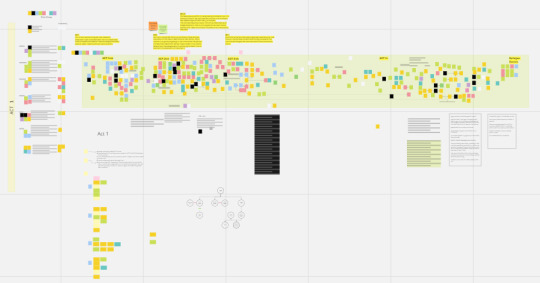
I would say that- for your question on character relationships- the answer does come down to being really specific about what you include. Make sure characters are meaningfully different from eachother, give them goals and experiences that clash and then force them to live/work together in the same space. If you have put time into building your characters before that, then you just need to create opportunities for them to get into conflict and bring out the best/worst in eachother. I really do believe that characters are quite boring in a vacuum- which is why I put so much emphasis on including narrative foils ^^ Tyvm for the ask <3
#gitm au#ghost in the machine au#ghost in the machine#asks answered#fnaf dca#qwillewrites#qwillechatter
196 notes
·
View notes
Text
Sorry, still thinking about The White Olive Tree which is living in my head - I fully accept that the ending could be nothing but what it was but in my head I want to either write a 40k slow healing fic or, since I know I don’t write, rewatch Hidden Love to see Chen Zheyuan as a good guy who gets fluff and happiness.
But aside from that, I am thinking I haven’t seen a drama outside (pun) the old Taiwanese drama The Outsiders (sheltered rich girl rebellious poor boy fall in love, her fam disowns her he becomes a killer for the Triads as the only way to eat, they end up utterly destroyed by the darkness) which went so hard on the “their love was pure and true and it would have been better for both of them if they never met.” Maybe A Love to Kill kdrama?
All I know they don’t really make them much like this any more - fluff yes and overcoming adversity yes and yes gritty “we are cool and world sucks” stuff commissioned by Netflix and co. But not something that is delicate and tender and following two gentle people and yet such an utter slow thorough breakdown.
It’s old school in the best way which might explain why I love it. I am thinking of Taiwanese Silence and Japanese Taiyou No Uta and Korean Snow Queen - being good not really resulting in a happy ending. (The ending of Silence with Vic Chou’s character speaking into the camera about how terrified he is still stays with me - ooof.) I genuinely think this is one of the reasons this wasn’t a big hit - this sort of vibe is not one current audience see much of and not sure want much of. (Compare it to CZY’s own mega hit Hidden Love which I adore but which is very much on the opposite end of the spectrum in terms of just world paradigm. His character has some tragedies in his background but they never take over the narrative and he ends up loved and happy. It is a much more comforting narrative.)
I think the sort of narrative Olive gives us - trauma stays and heroism sometimes is not enough - isn’t even that common in costume dramas any more (Eternal Brotherhood and Heroes 2024 gave it to us and both were small dramas for a reason - I cannot think of a big budget costume production with that theme in the last five years. LYF got close but ultimately chickened out.) And it is hugely uncommon in moderns. I don’t have any issue with that because everyone has different tastes and I am not one to mandate to others - but for someone who loves the Olive type narrative, it was like water in the desert. (And of course even old dramas or shows from most anywhere rarely dwell on trauma the way Olive did - not inspirational, not dark/cynical. And to give it to one’s male lead, and one in such a macho profession and one who is a bona fide hero, is freaking wild in how unusual it is.)
I mean, Olive stands out in its themes even from my other favorite modern cdramas. If we take a look at Lighter and Princess (another modern love story with a driven damaged ML and a ride or die FL who has been hurt herself but takes on his demons repeatedly) or Will Love In Spring (two differently damaged people discovering love with each other) or Go Ahead (damaged quasi adopted boys healing with help of found fam) - they all have happy endings with the mains so much better off than they started. Because the degree of damage is different and less, because the world is kinder and the environment less extreme. The FL of L&P would follow ML into hell if she had to but she didn’t have to, maybe just a little bit of the purgatory. He’s quite damaged (especially after jail) but it’s the kind of damage that can be slowly healed with love and support, it doesn’t need diagnosis and meds. Olive could have perhaps gone that way before Zan went back for the last time but as is…
Anyway, I am not sure I even have a point other than I love this drama so so so so much. I never thought anything would displace the perfection that is Lighter and Princess from my first place as a modern cdrama but here we are…
PS still shocked how hard Olive went. I was so sure they’d never go as hard as the novel. And then they chopped off his fingers.
37 notes
·
View notes
Text
Ok, The Magnus Arcives theories update!
Currently on MAG 55 (slowed down a bit, life getting in the way and all that unfortunately) but theories are evolving:
• Gertrude Robinson 100% knew way more than we thought, she describes the hidden place Walter Heller found in Egypt as an "archive" almost immediately, as if she knew what it was ahead of time, and specifically keeps it hidden from Elias. The fact that this is something well known to her definitely means there's something bigger going on here.
As well as that, Walter mentions a creature in the "archive" that chased him out with "a single lidless eye" and the Knight templar who had scratched his eyes out. All this is creepy, sure. But hearing that when John broke into Gertrude's apartment, all her books that had people on the covers also had their eyes perfectly cut out screams something "watching her" perhaps? As if the Archives are not only things that span the globe but also are linked to sight, eyes or things "watching"? I suppose? Links to Walter being able to see in the "archive" despite it being complete darkness, as well as he himself feeling like he's being watched by "a thousand eyes". And then she goes and blows it up? At least I assume it was her, but whatever it was she did not want it to exist once she knew where it was and what was there. So interesting.
Feels like a shot in the dark, although I can't help but think that is something important. Like with that cult lead by Maxwell Rayner having eye iconography too, it's appearing a lot more often now.
• "Michael" showing up again was big! Stabbing John, talking about a war and when John doesn't know what he means telling him he's obviously in the dark about something? crazy stuff. I absolutely think there's a much larger force at play here. Michael says he was staying neutral but stepped in to make sure the archives didn't prematurely lose I suppose, but it makes me think hes on a side here, as if he's working for someone (or something I guess, feels like it'd be appropriate here too haha). There's something going on and John (and by proxy me lol) is very much in the dark.
If I remember right he talks about the archive being important but I could be wrong, but regardless it seems the Archives are more than just a collection of supernatural items and stories. It's a player in a bigger game that I don't know yet. And I adore that!!
•Michael Crew intrigued me actually, leaping out of a window and disappearing? absolutely cool, but also so interesting, like he was being chased by a storm itself. The stuff he was chanting, Altiore of course being about the book "Ex Altiore" (sp?), but he mentioned something about "The vast" which peaked my interest. Vertigo too, so did he mean the vast open sky maybe? With vertigo linking to great heights and such, and he did leap out into open air. There was a previous story about the guy skydiving and being taken to an infinite open sky? You could describw that as "vast" but then that feels like it would connect to the storm, being in the sky and such, so I'm unsure.
Very, very interesting though, and another fun return of the Leitner tomes being pains in the ass for everyone involved of course. They are biiiig players in the overarching story here and I love it, wondering if we will see Leitner at all in this? or if he's just "haunting the narrative" here I guess is the term?
• Final one for now as this is loooong. Simon Fairchild returning, with the diving story and the infinite black darkness with the hand in it, and finding out his family is rather powerful. As well as the Lukas family too with the boat and sacrificing a crew member to the open ocean. Big families being connected to supernatural cases is a running theme lol, but I love it, and with Simon Fairchild suspected to have been the conman who was also thrown out a window (I think that was said? I may have gotten that detail wrong but even so the rest links I believe) and having connections to the open air as well from the skydiving story, there's absolutely a connection there to Michael Crew for sure. Simon also looking for his family's boat, and the Fairchilds owning sea based businesses (Once again, I think so? A tad spotty on those details) as well as the Lukas family and their shipping company, perhaps they both serve the same thing? Something to do with vast open things, like the sky and the sea? Clutching for straws here, but I'm holding them tight lol.
All of this feels like it links to a bigger picture "Michael" spoke about before. I'm so invested!
but yeah, just some fun observations after listening a bit further I wanted to talk about. nothing huge I don't think has been revealed? I'm worried I'm missing things now lol. but yeah, enjoy a little deep dive theory crafting!
29 notes
·
View notes
Text
Mixed thoughts about the dunmeshi collab event so far. There’s a lot of missed potential, I think a lot of people have been talking about that, in terms of like. Deeper engagement with the really interesting common ground these two stories have, or the chance to take a note from Ryoko Kui’s focus on how ecology underlies things we might take for granted, or interesting character parallels and connections between AK and dunmeshi characters.
They seem to have gone for a comedy vignette style instead, which is a little bit of a shame, but not an unreasonable choice for a collab, leaning toward the tone of the first few chapters of dunmeshi and not tipping the hand on how it evolves.
The quality is pretty varied.
So far as I’ve played, the Acahualla and Rim Billiton chapters are boring. They don’t lean deep enough into the ecology of Terran animals or connect them to one another—seems like they’re doing a lot of making it up on the spot and just saying stuff. It’s a bit like the Tales series worldbuilding quirk where they’ll just tell you about something that exists somewhere in the world and make no other connections, but with less charm. Doesn’t capture the source material. I liked the flashlight bit though.
The Sami chapter was ass. There was such an interesting angle to connect Senshi’s worldview with the Sami way of life—eat or be eaten, we’re all animals, knowledge and familiarity with the land is king in the wild—in a way that could really get to the heart of Dunmeshi’s themes while keeping it light, but they didn’t do anything with it. Them eating the collapsals is a terrible move. Senshi would never let that happen, and it breaks investment in the story—like what happened to them after? Did that shit happen? It’s dumb.
But the Big Bob chapter and the Who is Real chapter were excellent. We get a little insight into how people in the wastelands of Terra do things, and the idea of farming originium slugs and having to prepare them in super specific ways was really cool and a great use of the collab. Similarly, Laios finding his way out of the painting by looking at the ecology and comparing it to the dungeon, seeing it doesn’t close its own loops and animals don’t behave in reasonable ways? It’s peak. The idea that ink spirits ferment fruit in their guts bc they don’t have a proper digestive track is awesome. That he was able to find his way out bc Dusks’s paintings are founded on a narrative emotional and interpersonal logic (she’s an artist) and not a logistical ecological logic like the mad sorcerer, and that Laios is the kind of guy who’s notice? Perfect.
Cautiously excited for the Seaborn chapter. It could be super stupid, it could be peak, there’s no way to tell. Decent event so far, but not the best.
30 notes
·
View notes
Text
Catwoman Vols 1 & 2 so far:
I’ve just finished Moench’s run and am eagerly anticipating moving onto Devin Grayson’s, so I thought I’d do a round up of the various writers on the title so far, because it is very, very 90s in places, and I’ve been trying to sort out the differences in approach for myself.
Let’s talk about the writers!
Mindy Newell (Catwoman 1989): I think the most valuable work Newell does with this series is how it takes Batman Year One and refocuses and explains the story in terms of its effect on Selina as a character. It gives her (and Holly and Maggie) agency in the narrative that was not present in Miller’s work. (They should package this as a back-up with Batman Year One, just as Oracle Year One should rightfully be at the back of any reprint of The Killing Joke, if DC had more respect for its female characters). I also really like Newell’s focus on the impact of the grittier aspects of the story on Selina in particular: you really can see her background in nursing in the writing.
Mary Jo Duffy (Catwoman #1-14 1993): What I particularly liked about this run is the fun Duffy had in slotting Selina in around everything else going on in the narrative. Her run is set across Knightfall overall, and informed by it, but rarely fully crosses into it. I love little bits like Selina sneaking onto Bruce’s flight to Santa Prisca at the start of Knightquest, the flashbacks of her history we get here (training as a circus acrobat!), and the repetition of Selina’s ongoing focus on danger and poverty among children and young women on the margins of society. It’s a very episodic run – characters are often dropped straight into the story in a way that you presume that they had been previously established somewhere else (like her butler, Wilder, who just appears in issue #8, or the animal rights protesters in the Knightquest crossover), but no, they’re brand new.
Peter Milligan (Batman: Catwoman Defiant 1992): Milligan really only has this one-shot. It’s interesting in that it’s a proper team up with Bruce, which is otherwise quite unusual around this period in Catwoman titles – she’s more likely to reluctantly end up working with Tim or Jean-Paul than Bruce himself. It’s a lot of stuff about the faces you show the world and secrets concealed, which goes into the core of Bruce and Selina’s relationship.
Deborah Pomerantz (Catwoman #22-24 1993): This is a classic ‘steal from the mafia in Gotham’ Catwoman storyline. Selina tries to steal something from the family and then gets overinvolved in the many many plots everyone in the crime family are running on each other. I don’t think this is the best execution of this basic plot I’ve seen in a Catwoman run, but it’s a familiar one.
Alan Grant (Batman: Shadows of the Bat #43-44, Catwoman #26): Grant gets a crossover with Catwoman here with both Ratcatcher and Catman running around the narrative being terrible. I wouldn’t say it’s his best work; the approach to Thomas Blake in particular reinforces the culturally appropriative nature of his backstory regarding his source of powers, and his position as a joke character before Gail Simone rescued him from the set of D-listers that nobody cared about for Villains United and gave him a full personality and backstory makeover. It’s…fine. It does give Selina and Thomas just cause to have beef with each other outside of their overlapping themes.
Chuck Dixon (Catwoman #15-21, #25, #27-37 1993): Dixon’s run is one of those world-hopping thief of adventure, Selina Kyle! style runs. She’s very rarely based in Gotham itself during his run, and is generally getting commissioned to go off to international locales to steal things and end up in situations. It has, on reflection, got more than a little of the flavour that Dixon ends up using for his Birds of Prey run. It’s very Dixon in places, particularly in how many male characters are attracted to Selina (there’s even a potential forced marriage to an evil European aristocrat that Selina manages to duck out of, which…yeah, shades of Dinah/Ra’s anyone?) and also in his very free hand with the concepts of ethics around archaeology and artifacts. We go raid an ex-Nazi compound, at one point. We also have a very Indiana Jones style adventure into a combo of ancient Order of St Dumas and League of Assassins secret plots.
Doug Moench (Showcase ’93 #1-4, Catwoman #0, #25, #38-53 1993): I think what I get a lot of out of Moench’s run is titillation for various characters with a whole heap of Sexy Villainesses (and not only because we’ve got Balent on art), and a heavy focus on Selina’s Terrible Birth Family and Childhood In Orphanages and Reform School leading to her learning to steal. There’s a whole plot thread running through his run from #0 up to the end about one of Selina’s rivals, Cassandra Cartland, who also was a thief in the orphanage and wasn’t as good as Selina. He does Catwoman Year Two, which is honestly mid: it’s a lot of Selina thinking she’s oh so clever (while not being) and using other Rogues as cover to distract Bruce while she commits thefts. There is definitely a focus on Selina’s joy in stealing things and enjoyment of both the challenge but also possessing shiny things. Moench also does do a chunk of work with Selina’s pivot towards caring for the underclasses in his Showcase ’93 story, Struggle Street, in terms of establishing that as part of her post-Crisis characterisation.
21 notes
·
View notes
Note
Kaylors especially LSK always reference Karlie as Taylor’s muse seems blind to all the other flings / relationships. also why are Kaylors always so dam aggressive when you mention other female potential muses and will do anything to make everything about kaylor.
Such a gooooood question!! I have many thoughts on this, but I think it boils down to a few key things:
I've noticed Kaylors tend to have no issue discussing Tayliz or sometimes even Swiftgron (but only 2012-13, with a sharp cutoff) because, well, it doesn't interfere with their Kaylor Narrative of late 2013 onward. But even though myself and most Tilys believe Kaylor was def a thing 2014-15ish, just that...then they broke up and Tily was together by mid 2016 -- that's a narrative/timeline they refuse to consider. Believing in Tily isn't Kaylor erasure, it actually helps fill in a TON of holes that present themselves in post 2015 Kaylor theories. Since most Kaylors adamantly want to believe that KK is the main muse for Rep *and* Lover (and onward, for a lot of them...), then they have to shun Tily lore and proof because summer to fall 2016 is when Taylor and Lily began spending more time together; then Lily went to Thanksgiving with Taylor and SAT NEXT TO her father; and then multiple photos of Lily from Dec 2016 and Jan 2017 place her IN the London apartment. Kaylors just opt to ignore all of this though.
Beyond the basic timeline explanation above, there's also something else key at play: since Kaylor was SO very much in the public eye as besties who went everywhere together for a good deal of 2014 - 2015, and then Rep came out in 2017 and was SO very sapphic, it seems a lot of Gaylors just had to immediately attach the gayness of that album to Karlie because it's the woman they'd been theorizing about for multiple years at that point. It seemingly doesn't matter to them that Kaylor went from spending a ton of time together in 2014-15 to very little in 2016 to...literally nothing in 2017 onward. There is ONE photo of them from 2018 when Karlie went to ONE Rep show, and she posted it to IG and Taylor didn't even bother to like it or comment lol. Similarly, Karlie wrote Taylor a bday post in 2016 that Taylor...also did not like or comment, a stark contrast from how they engaged with each other's social media frequently in 2014-15. In fact, Karlie was in Australia for work for a good deal of Dec 2016, at the time that we know Taylor ran away with her lover...to LONDON. If she was with Karlie, why wouldn't she have found lodging in Australia to hang with her boo? There is so, so much that truly does not add up re: Karlie being the muse for Rep, an album entirely rooted in the theme of finding a NEW LOVE circa snaktegate/when her reputation was taking a hit in summer 2016, and again, we know that Kaylor was at its height in 2014 into early 2015. Furthermore, suddenly Taylor is referencing her new lover being non American with an accent and infusing tons of British-isms ("fit like a daydream," "fancy you, not fancy stuff," etc.) in Rep lyrics which she hadn't done before. Harry Styles is also British but she didn't use British-isms in 1989 because he was her beard for Dianna and Di isn't British... yes, Taylor absolutely uses lyrical red herrings here and there to sell the het-narratives of her beards, but it is usually a line here and there. In order to believe Joe was a beard for Karlie (instead of Lily...who is a blonde blue eyed introvert Brit just like him, a perfect match of beard to real partner), you have to believe that Taylor suddenly started throwing SO MANY red herrings into Rep that don't fit for the actual lover she had at the time. Not to mention how before settling on Joe for a long term beard, Taylor also had the brief PRlationship with Tom Hiddleston - another Brit! Why would she be so hellbent on getting a BRITISH blue eyed Brit in order to cover for her... St Louis born, NYC based hazel eyed gf?? Make it make sense.
Anyway, those are my main thoughts on it! Thanks for the question and I'm always happy to discuss further xoxo
15 notes
·
View notes
Note
i was just reading your theories and the time travel/never ending story one really gave me shivers. it works with the small scale of this story, whereas often time-based ideas in works of fiction involve sci fi or space travel where things are much more futuristic, like interstellar or arrival.
seeing as back to the future and a wrinkle in time are obviously referents, i am wondering what you think the narrative and artistic significance of a time loop storyline for the show would be? is it the duffers just paying homage to their fav exciting twists from cinema, or would this choice have another meaning other than being super cool? even shows like true detective explored the mystery of non-linear time, but none of these shows address the intrinsic paradox of a causal loop: namely, that it's impossible in a linear timeline (for e.g. the future person would have had to survive whatever the threat from the present is in order to live and be able to go back in time and save themself, etc). so stranger things would have to really hammer home its belief in non-linear time for this causal loop theory to work.
unless... their emphasis about time isn't going to be scientific at all, but about human emotion: aka perceived non-linear time? we have hints towards this in the show: most explicitly, el mentioning that time speeds up or slows down according to how you feel.
all the symbolism like henry's clocks and will's apparent week in the UD could reflect this, and i think this would also work well with all the experimentation themes: how el's sense of place and time differs compared to someone who hasnt lived in a lab, the way music changes your world, etc...
so basically what i'm asking is: do you think that the timey wimey stuff in the show is going to be revealed as perception-based, emotion-based, almost solipsistic from (possibly) will's pov? that time as an objective thing doesnt matter, because it's our experience of the world that we feel, and so 'real' and 'not real' don't matter because if something feels real to us, it IS real?
i personally would love this, because to me ST is a human drama not a sci-fi first and foremost, so i want the sci-fi aspects to reflect something about humanity, rather than be the main point of the story.
[Hi anon, thank you for your thoughtful ask! I'm really sorry it took me the better part of a year to get around to answering this; I wasn't ignoring you, the executive dysfunction just won this round.]
I would argue that time travel stories always reflect something about humanity, regardless of how focused on the sci-fi aspects they are.
Arrival's alien-induced visions of the future are about embracing the worst parts of life knowing that the best parts are worth it;
Terminator's self-creating time paradox is about the irresistible spark of hope in the face of insurmountable man-made horrors;
Interstellar's time dilation is about the love and sacrifice parents make to secure their children's futures.

Sci-fi is fundamentally about exploring humanity's relationship with the world around us -- how we manipulate it, how we survive it, how we help and hurt each other in the process -- and imo Stranger Things doesn't particularly depart from the conventions of the genre just because it's so character-focused.
So I don't think it would really make a difference whether its time shenanigans are "real" or just a trick of human perception -- so long as the Duffers can stick the landing, then it'll resonate with our emotional relationship to time and growing up either way.
But I also suspect you're right: the causal loop theory you liked was a fun idea but I don't think it reflects the show's foreshadowing all that well.
Like you said, El alluded to time travel being emotion-based--

--and Henry describes his frustration with time in terms of arbitrary human ways of structuring it.

Which is more likely: that there's some secret sci-fi time travel mechanic the show just hasn't revealed yet, or that Vecna's going to use the mind powers we already know he has to fuck with people's perceptions of time?
My honest opinion? ...I think it could be both.
For one thing, the Duffers are in the habit of hiding big reveals of what's really going on (e.g., Vecna's existence prior to S4); for another, The First Shadow revealed that Brenner's backstory has a lot in common with The Philadelphia Experiment, suggesting we might be in store for some sort of inter-dimensional timey-wimey mess created by the lab.
But equally, the perception-based foreshadowing is (1) blatant as hell; (2) a more promising avenue for explaining why the Upside Down is a copy of Hawkins frozen on the day Will lost his innocence; and (3) just generally a better fit for Henry and Will's connection.
Both at once sounds like the sort of thing ST would do: give a sci-fi plot to El, a psychological horror plot to Will, and have them dovetail satisfyingly at the end for a big emotional payoff.
23 notes
·
View notes
Text
Okay, I've Read Worm: A Retrospective Part 4: Let's Give Wildbow Some Fucking Well-Earned Praise
So, I've had a decent number of harsh words for Wildbow over the course of my liveblog, and also over on my main blog. Overall, most of them are about his WoGs or Ward, rather than Worm itself. I've also commented I don't think I'd enjoy talking to him (not that he's likely to ever reach out, but you know). But I've had some complaints about Worm too.
But the thing is, I did read Worm. I read the whole thing. A desire to write fanfic would not have kept me going through all 30 chapters if I hated it. Or even if I just thought it was like, mediocre. It's 1.6 Million words. I am not that kind of masochist.
Life is short, Worm is long, if I wasn't enjoying it, I'd have left a long time ago. So I did enjoy it.
And the thing is, even if I never pick up his other works (and I do intend to try some), I am no doubt going to have more harsh words for Wildbow in the future. And I have no doubt that even if I love say, Pact or Pale or Claw or Seek or... I dunno, his next Web Serial after Seek called *throws a dart at a wall* Iota, I'm sure I'll have harsh words. I can't think of a single creator of anything that I don't have at least some issues with something they put out.
And to be fair, even most people who fully like Worm and Ward tend to have some harsh words for him now and then, or at least negative ones.
BUT, I liked Worm. And so, I think it's fair to really sit down and give him some unalloyed, unambiguous praise.
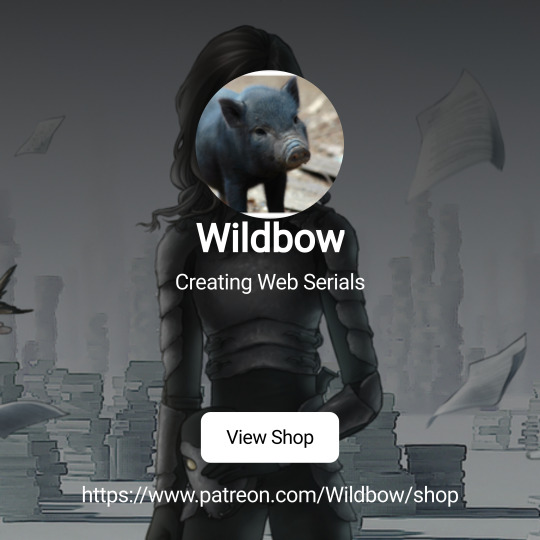
The Pace of Output: This is probably low-hanging fruit, but it is genuinely impressive that Wildbow wrote Worm as quickly as he did, sticking to a schedule as consistently as he did. I am in awe. I think even if I didn't have to work at all, and was able to write all the time, I wouldn't even be able to match half of what he did in the same amount of time, in terms of output. Wildbow accomplished something that is genuinely amazing here.
The Shards, Entities and Powers: Shard mechanics are not my favorite thing about Worm. But the whole thing really does come together well. It's a pretty cohesive, pretty well directed power system to tell the story he wanted to tell. I don't consume much cape fiction, so I don't know what stuff beyond Marvel and DC are really like in terms of how powers work and how they all fit and service the story, but for Worm, the Shards work to tell the story he wants to tell, really well. I read and write mostly fantasy and sci-fi, and spend a lot of time in worldbuilding spaces dedicated to both, or have at least, and a lot of would be writers fall into the trap of trying to overdevelop the magic system or the rules for whatever crazy supertech their story has without really stopping to figure out how it fits for the story they want. That's generally not a great approach if the intent is to have a story, and not just a cool setting or a fun magic concept. Wildbow created a pretty cool system, and then managed to avoid the common trap of getting so attached to the power system and it's rules that it interfered with telling the story he wanted to tell. Instead, he built and bent the system with his story as the driving purpose, and kept it all cohesively working within that framework.
The Interludes: The Interludes are without a doubt some of the best shit in Worm, overall. The way he is able to convey so much about these characters in these cutaway scenes and expand the world and advance the story and develop ongoing themes and narratives? Nearly every Interlude is doing like, 4 things at once, I swear to got, and the way he juggles that all together is awesome, and the end result is great. I will never go back and reread all of Worm from start to finish. But I will sure as shit go back and read some of the interludes just for the sheer fun of it. The way these cutaways manage to get you inside the head of these people, see their perspective is really good, takes real skill to make you go 'I really kinda see Saint's POV here' for his Interlude, for instance. Really good.
Amy Dallon: So like, I think it's clear I love Amy. She's fascinating. I have big feelings about her, and she's a divisive as fuck character. But Amy Dallon is the most fascinating character in Worm for me personally and she's genuinely one of the most fascinating characters in anything I've read. I'll have more to say about Amy if I manage to get a version of that Amy retrospective I'm happy with written, but unironically? Wildbow, thank you for writing Amy Dallon. I bitch about how much she's taken over my brain, but Amy is such a fascinating, interesting, enjoyable and engrossing character that she has been a net positive for me. Reading Worm and reading about her has enriched my life. Thank you. You did a damn good job with her in Worm, Wildbow.
Taylor Hebert: As I said back in Part 1 of this retrospective, I was worried I'd find Taylor insufferable. Her capacity for self-rationalization should be an issue for me. It often can be in other characters. But Wildbow managed to write Taylor amazingly. He created a character who is multifaceted, multilayered, complex, nuanced and yet, pretty simple. She's intensely relatable, and yet, she is also deeply, deeply alien and abnormal. She does absolutely insane shit, and yet, when you're reading along with her POV, so much of what she does and thinks makes her seem like the only sane woman in the room. Even when you take a step back and realize what she does, she's very hard to not like. Even if you want to grab her by the shoulders and shake some sense into her, you like her. She's great. She's an everywoman, she's no woman. She's clever and stupid and brilliant and unimaginative all at once. She is... She's Taylor Hebert. She's an antihero, a villain protagonist, a hero hero and... she's just some fucking girl.
Heroes/Villains: What I mean by this bulletpoint is - villain protagonists, making villainous characters sympathetic - that's easy enough to do. And making the 'official heroes' of a setting not really as great as they might seem is also fairly easy to do. But it is hard to pair the two together as well as Wildbow did. The Undersiders do a lot of bad things (I would disagree with people who say they're all *fundamentally* bad people - even Regent... ish, kinda sorta. He's so fucked up due to his background that calling him fundamentally bad is probably not really accurate. Though some people draw red lines around some of what he did, so that's more subjective. But like, the key thing is that he did that while *also* still making them pretty sympathetic without like... running protag-centered morality and still making them have done quite a bit of good (and a ton of bad) AND the handling of the heroes. Because it really does look a lot like he's doing a bit where the 'official heroes' are the real bad guys of the story between things like Armsmaster's shit and Interlude 2, but he also doesn't actually do that. And he executes it in a way that is really well done, without doing the thing where the narrative acts like someone is evil but like... the person isn't.
This isn't really an exhaustive list of 'everything Worm did well' or even 'Everything I liked about Worm', but it is stuff that Wildbow did really fucking well, that I really liked or am impressed with, and that he deserves unalloyed praise for.
There are reasons why I kept reading Worm, and those are some of the reasons.
(There could also be a point on how he manages the readers' information diet, but it's really hard to say for sure if it's something that I really liked because I came in so thoroughly spoiled. From what I can see, I think I would have liked it and given it the unalloyed praise normally, but it's impossible to say because I knew what 75% of these clues were ahead of time).
Mr. Bow - you did a lot of shit I don't like. But holy motherfucking shit, you did some goddamn amazing stuff too.
#Okay I've Read Worm: A Retrospective#Worm Web Serial#Wormblr#Worm Parahumans#Worm Wildbow#Kylia Reflects on Worm
39 notes
·
View notes